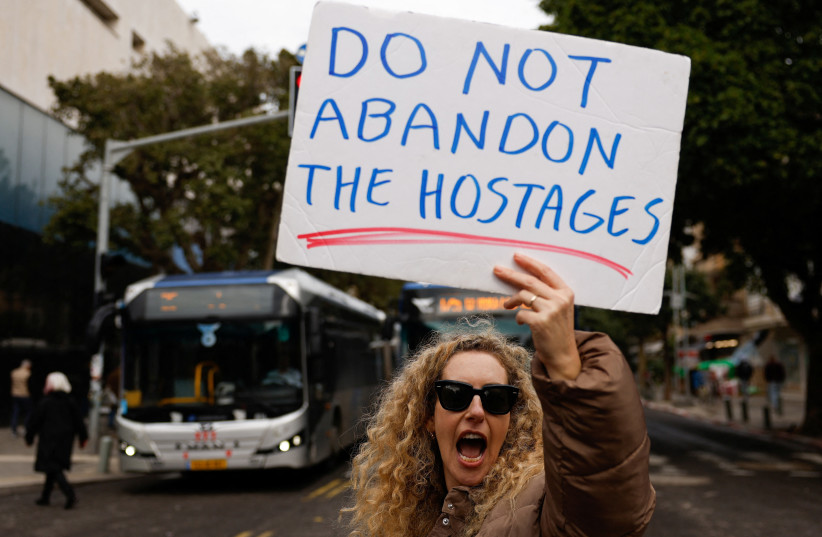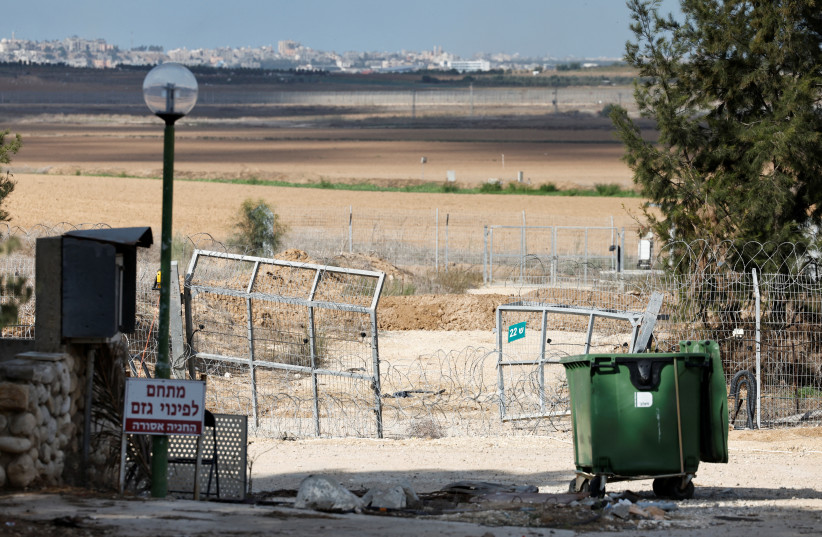Two former senior Shin Bet officials have shared with The Jerusalem Post their views about how a state commission of inquiry into the October 7 failure to prevent Hamas’s catastrophic invasion of southern Israel should take place.
Opposition officials have been calling for the commission to already be established, State Comptroller Matanyahu Englman has tried to establish his parallel inquiry, and IDF Chief of Staff Lt.-Gen. Herzi Halevi tried to establish an external review of national security issues relating to October 7.
Halevi and several defense chiefs have taken responsibility for the failure and signaled they will resign when they feel the current war is far enough along.
In contrast, Prime Minister Benjamin Netanyahu has fought hard against establishing any commission anytime in the foreseeable future and has tried to blame anyone other than himself for the October 7 failure.
Ex-Shin Bet chiefs: Probe must be delayed until hostage, Hezbollah issues over
Into all of this dicey politics enter former Shin Bet head of the counter-terrorism division for Jerusalem, Judea, and Samaria Arik “Harris” Barbing and former top Shin Bet official Shalom Ben Hanan, who retired in 2022 after 27 years in the agency at the equivalent rank of an IDF major-general in charge of a whole division – both of whom have no interest in politics and are razor-focused on security only.
Barbing said that the commission is crucial and should never be delayed by politics, but must be delayed until the issues of the Israeli hostages held by Hamas and the tensions with Hezbollah in the North are resolved.

According to Barbing, the inquiry issue is very complex, because all the politicians want to avoid being blamed, but it is crucial to probe properly and thoroughly for the good of Israel’s long-term security.
He said that top apolitical security professionals must sit on the commission to ensure the necessary level of expertise and to raise it above politics.
The former Shin Bet official did warn that there would be a point where politicians might continue to try to delay the inquiry, but at which it must go forward, because otherwise someone “will always say this is not a good time yet.”
Rather, he thought the issues of the hostages and the northern border with Hezbollah were objective security problems that need to be resolved without distractions, but that after these dilemmas were handled, there should not be further delay.
Moreover, he said that the commission should not just look at October 7, but should look back at major security decisions taken by top leaders for at least 10 years earlier, if not longer.
Regarding the inquiry, Ben Hanan said, “We need to have it. It needs to be done seriously for all of the sides of this war – from the intelligence failure before the war to all the ‘conceptions’. All relevant apparatuses need to be checked. And there needs to be a section focused on the management of the war itself.
“There needs to be a wide bipartisan agreement for the inquiry, which must have many people, and not just the standard three. Somewhere around 7-10 people. Politics needs to be put aside,” said the former senior Shin Bet agent.
Also, Ben Hanan said that officials on the commission must at minimum include officials with backgrounds in “law, the IDF, the Shin Bet…there needs to be a diversity of opinions and it needs to be done professionally.”
Next, he stated, “The inquiry needs to focus a lot both on analytical intelligence for warnings of attacks and also at operational issues, and to look at the things that were done well also.”
Regarding the timing for starting the inquiry, Ben Hanan said “It should not harm or set back ongoing high-level military efforts [against Hamas] but it also can’t be too late. It can’t wait for a whole additional year, even if the war continues longer,” because the public needs to know what went wrong and how to improve.
Ben Hanan was pressed that the IDF has already declared it has operational control of northern Gaza and is on the verge of declaring the same in Khan Yunis, such that those who want the inquiry to state immediately could argue that the high point of the war has already passed.
Responding, he said, “If we do not get the Hamas leaders, we need to continue into Rafah and then that would not be low-intensity conflict,” meaning the war would return to a larger scale.
“It is important not to disturb the war,” the IDF chief told the comptroller, who requested certain internal military documents, that having to deal with the requests would harm the war.”
There is public disagreement about this, said Ben Hanan.
Internal IDF operational review is running late
Also, he noted that the IDF chief tried to start an external review, something which he thinks is unnecessary for the IDF to do if there is a state inquiry. All that matters regarding any conflict of interest concerns is that the inquiry panelists were not part of the key October 7 decisions.
At the same time, he said that the internal, narrower IDF operational review itself is running late. “The IDF and Shin Bet each need to finish these already,” he said.
However, he did say, “Once the war is really on a lower flame, where the IDF is mostly just doing narrow penetrations and missions [versus large-scale invasion], then the inquiry can move forward.”
Returning to the inquiry itself, he explained, “A state inquiry is distinct and goes deeper and wider [than a narrow IDF operational review]. The state inquiry will take a long time and will be very complex. It will need to review decisions going back for years, and not just what happened on October 7.”
“There are many sides to it, and many people involved, including [former IDF chief] Aviv Kohavi – his term also needs to be reviewed. And we need to check IDF chief terms even before him,” he added.
During the inquiry, he predicted, “People will reveal new things. Anyone on the state commission will need to be completely clean of political bias, or with almost no hint of political bias. Whoever has expressed a public position in the last four years and has said things publicly 10 times, will be viewed as biased, and this will hurt the perception of the commission’s objectivity.”
“In the result, there will be many more people involved than people think, but some will be more responsible and some will be less responsible,” declared Ben Hanan.

Ben Hanan was questioned whether the problematic way that Israeli leaders thought about being able to live with Hamas and deter it went as far back as 2005-2007, when Israel withdrew from Gaza and Hamas eventually ousted Fatah and take it over.
He replied that it might go back even earlier, “since even during the Second Intifada [2000-2005], then Shin Bet chief Avi Dichter said Israel needed to do a major ‘Defensive Shield’ style operation in Gaza like was being done in the West Bank. There was a heated debate, but we did not do it and not doing it was the decision of the government.”
Of course, he said the farther back you go, there are greater questions about how much distant history can be said to be as responsible for October 7, and some might say certain past events were too far off.
He also asked whether the security fence that was built to separate Israel and Gaza was the right kind of fence. “Could it have been a different kind of fence?” he pressed. Further, he raised questions about other aspects of the Gaza perimeter security in terms of the use of ground troops.
Also, he was critical of what he called the IDF’s lenient rules of engagement, which allowed Gazans to sometimes come up to the security fence without IDF soldiers employing lethal force on them.
Ben Hanan said “dozens of people, not just one or two, may be responsible” for years of incorrect security strategy with Hamas and Gaza.
“As historic as October 7 was, so too must the state inquiry be,” he said.
